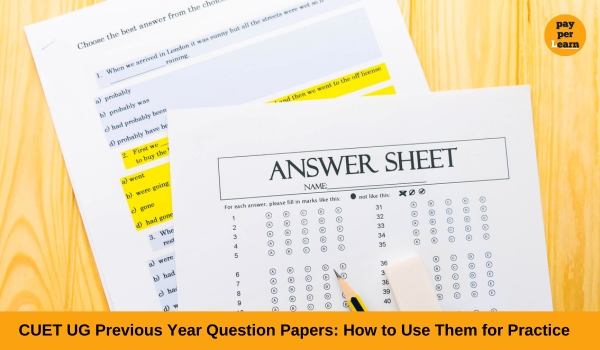The Assam Public Service Commission (APSC) exam is getting more competitive each year. Traditional coaching methods can be rigid, expensive, and time-consuming.
CUET UG Previous Year Question Papers: How to Use Them for Practice
Preparing for the Common University Entrance Test (CUET) can be a daunting task for both students and their parents. With the right strategies and resources, however, this journey can become more manageable and effective. One of the most valuable tools in your preparation arsenal is the CUET UG previous year question papers. In this guide, we’ll explore how to utilize these papers effectively to enhance your preparation and boost your confidence.

Table of Contents
- Understanding the Importance of Previous Year Question Papers
- Benefits of Practicing with Past Papers
- How to Access CUET Previous Year Question Papers
- Effective Strategies to Use Previous Year Papers
- Common Mistakes to Avoid
- Additional Resources for CUET Preparation
- Conclusion
Understanding the Importance of Previous Year Question Papers
Previous year question papers serve as a bridge between your preparation and the actual exam. They provide insights into the exam’s structure, the types of questions asked, and the distribution of topics. By regularly practicing with these papers, you can familiarize yourself with the exam’s nuances, making you more comfortable on the test day.
Benefits of Practicing with Past Papers
- Familiarity with Exam Pattern: Regular practice helps you understand the recurring themes and question formats in the CUET exam.
- Time Management: Solving past papers under timed conditions trains you to allocate appropriate time to different sections, enhancing your ability to complete the exam within the given timeframe.
- Identifying Strengths and Weaknesses: By analyzing your performance on these papers, you can pinpoint areas where you excel and topics that require more attention.
- Building Confidence: As you become more accustomed to the exam format and question styles, your confidence will naturally increase, reducing exam-related anxiety.
How to Access CUET Previous Year Question Papers
Accessing these valuable resources is straightforward:
- Official CUET Website: Visit the NTA’s official website and navigate to the ‘Downloads’ section to find past question papers.
- Educational Portals: Websites like SelfStudys offer downloadable PDFs of previous year papers.
- Coaching Institutes: Many coaching centers provide compiled booklets of past papers, sometimes accompanied by solutions and analysis.
Effective Strategies to Use Previous Year Papers
To maximize the benefits of practicing with past papers, consider the following strategies:
- Simulate Exam Conditions: Attempt the papers in a quiet environment, adhering strictly to the time limits. This practice will help you get used to the pressure of the actual exam.
- Regular Practice: Incorporate past papers into your study routine, aiming to solve at least one paper weekly.CUET2025
- Thorough Analysis: After completing each paper, review your answers critically. Understand the mistakes made and revisit related concepts to strengthen your understanding.
- Seek Clarification: For questions you find challenging, don’t hesitate to consult teachers, mentors, or reliable online resources for explanations.
- Track Progress: Maintain a record of your scores and the areas where errors occur. This log will help you monitor improvement and adjust your study plan accordingly.
Common Mistakes to Avoid
While practicing with previous year papers is beneficial, be mindful of these common pitfalls:
- Neglecting the Latest Syllabus: Ensure that the topics you’re studying align with the current CUET syllabus, as it may have evolved over the years.
- Over-reliance on Past Papers: While past papers are invaluable, they should complement, not replace, a comprehensive study plan that includes textbooks and other study materials.
- Ignoring Time Constraints: Always practice under timed conditions to develop effective time management skills.
- Skipping Review: Merely completing a paper isn’t enough. The real learning happens during the review process, where you analyze mistakes and understand their root causes.
Additional Resources for CUET Preparation
Beyond previous year papers, consider integrating the following into your preparation:
- Mock Tests: Engage with full-length mock tests to simulate the exam experience further.CUET2025
- Study Groups: Collaborate with peers to discuss difficult topics and share diverse problem-solving approaches.
- Online Forums: Participate in online communities where you can ask questions, share resources, and gain insights from fellow aspirants.
- Professional Coaching: If feasible, enroll in coaching classes that offer structured guidance and personalized feedback.
Conclusion
Incorporating CUET UG previous year question papers into your study regimen is a strategic approach to enhance your preparation. They not only familiarize you with the exam pattern but also help in honing essential skills like time management and critical analysis. Remember, consistent practice, coupled with a thorough review, is key to excelling in the CUET exam. Stay dedicated, and approach your preparation with a positive mindset.
For more resources and personalized coaching, consider exploring payperlearn, which offers tailored courses to suit your learning needs.
Why Mock Tests Are Crucial for CUET UG Preparation
Preparing for the Common University Entrance Test (CUET) UG can be a challenging journey for both students and their parents. One of the most effective tools to enhance this preparation is the mock test.
How to Make an Effective CUET UG Study Plan
Preparing for the Common University Entrance Test (CUET) UG can be a daunting task, but with a well-structured study plan, you can navigate the preparation journey smoothly
Top Mistakes to Avoid While Preparing for CUET UG
Preparing for the Common University Entrance Test (CUET) Undergraduate (UG) exam is a pivotal step for students aiming to secure admission to their desired universities.
How to Prepare for CUET UG Without Coaching?
Begin by familiarizing yourself with the CUET UG exam structure and detailed syllabus for your chosen subjects. This foundational step ensures you know what to expect and can plan your studies accordingly.
CUET UG Subject-wise Preparation Strategy for Science, Commerce & Arts
when considering the diverse subjects within Science, Commerce, and Arts streams. This guide offers subject-wise preparation strategies to help you excel in the CUET UG examination.
Top Universities Accepting CUET UG Scores & Their Cutoffs
The Common University Entrance Test (CUET) has become a pivotal gateway for students aiming to secure admissions in prestigious universities across India. With over 345 universities participating in CUET 2025, including 47 central, 57 state, 37 deemed, and 196 private institutions, the opportunities are vast.
CUET UG Application Process: Step-by-Step Guide to Registration
The Common University Entrance Test (CUET) Undergraduate (UG) 2025 is a pivotal examination for students aiming to secure admission into various undergraduate programs
CUET UG Scoring System Explained | How Are Marks Calculated?

The Common University Entrance Test (CUET) UG is a crucial examination for students aspiring to enter central universities in India. However, many candidates find the CUET UG scoring system complex and confusing. How are marks calculated? What factors influence the final score? In this article, we break down the CUET UG scoring system in a simple and easy-to-understand manner.
Table of Contents
What is CUET UG?
The CUET UG (Common University Entrance Test for Undergraduates) is an entrance exam conducted by the National Testing Agency (NTA). It aims to streamline university admissions by providing a standardized assessment for students across different boards.
Understanding the CUET UG Scoring System
The CUET UG scoring system is designed to evaluate students based on their performance in multiple-choice questions. Here’s a detailed breakdown:
1. Marking Scheme
- Correct Answer: +5 marks
- Incorrect Answer: -1 mark (negative marking)
- Unattempted Question: 0 marks
2. Normalization Process
CUET UG is conducted in multiple shifts with different difficulty levels. To ensure fairness, NTA uses a normalization process. This method adjusts scores based on the relative difficulty of each shift.
3. Raw Score vs. Normalized Score
- Raw Score: The total marks obtained before normalization.
- Normalized Score: The adjusted score post-normalization to maintain uniformity across different shifts.
How is the CUET UG Score Calculated?
The CUET UG score calculation follows these steps:
- Calculate raw marks based on the marking scheme.
- Apply the normalization formula to balance out variations in question paper difficulty.
- Generate percentile scores to rank students.
What is the CUET UG Percentile Score?
The percentile score represents a candidate’s relative performance compared to others. It is calculated as:
Tiebreaker Rules in CUET UG
If two candidates secure the same score, the following tie-breaking criteria are applied:
- Higher percentile in the domain-specific subject.
- Higher percentile in the language subject.
- The older candidate gets preference.
Importance of CUET UG Normalization Process
- Ensures fairness across multiple shifts.
- Adjusts scores for varying difficulty levels.
- Provides an accurate ranking system.
Factors Affecting CUET UG Scores
Several factors influence the final CUET UG scores:
- Number of correct answers
- Negative marking for wrong answers
- Difficulty level of the shift
- Normalization adjustments
How to Interpret Your CUET UG Score?
Your CUET UG scorecard includes:
- Section-wise scores
- Total normalized score
- Percentile rank
- Qualifying status
How to Improve Your CUET UG Score?
Here are some tips to boost your score:
- Understand the syllabus thoroughly.
- Practice previous year’s papers.
- Attempt mock tests regularly.
- Manage time effectively in the exam.
- Avoid guessing to minimize negative marking.
Frequently Asked Questions (FAQs)
1. What is the passing score for CUET UG?
There is no fixed passing score; it depends on university cutoffs.
2. Is there a negative marking in CUET UG?
Yes, 1 mark is deducted for each incorrect answer.
3. How is the CUET UG percentile calculated?
The percentile is based on the number of candidates scoring equal to or below your score.
4. Can I retake CUET UG if I get a low score?
You can attempt CUET UG in the next academic session.
5. Does every university accept CUET UG scores?
Most central universities accept CUET UG scores, but some may have additional criteria.










